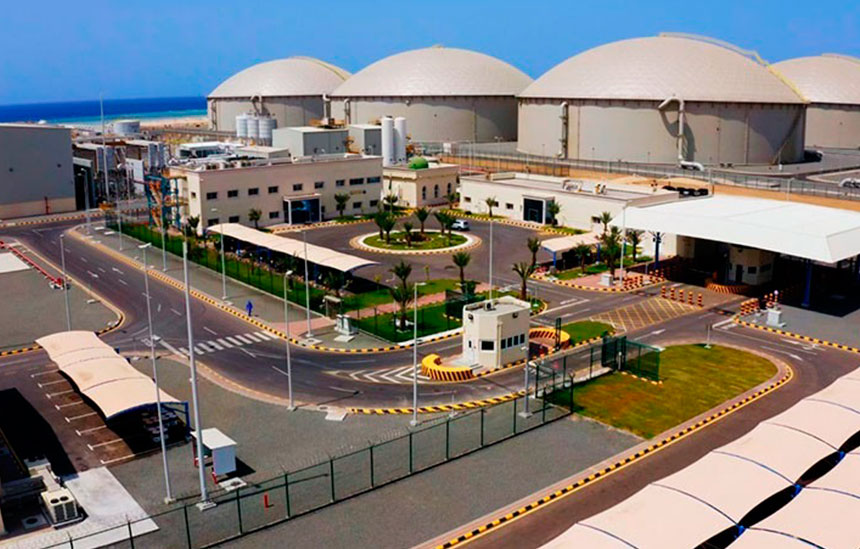- Facility achieved certification after a three-week process by the independent Records Management Team who examined verifiable, standardisable and measurable evidence.
- Rabigh 3 IWP produces 600,000 cubic metres of desalinated water per day.
- Project supplies water to nearly one million households across Makkah Al Mukarramah and Jeddah in Saudi Arabia.
ACWA Power, a leading Saudi developer, investor and operator of desalinated water, power generation and green hydrogen plants worldwide, announced that the company’s Rabigh 3 Independent Water Plant (IWP) in Saudi Arabia, has been recognised as the “world’s largest reverse osmosis desalination facility” by the Guinness World Records™, the ultimate global authority on record-breaking achievements.
Rabigh 3 IWP has the capacity of producing 600,000 cubic metres of desalinated water per day and can fulfil water demand of nearly one million households in Makkah Al Mukarramah and Jeddah in Saudi Arabia’s western region.
The record comes after an independent Records Management Team at the Guinness World Records™ verified the evidence over a three-week period.
ACWA Power is a global pioneer in applying reverse osmosis technology towards utility-scale desalination projects. The company commenced its journey with the Shuaibah Expansion IWP launched in the fourth quarter of 2009, supplying 150,000 cubic metres of water per day. This facility was the first project of its kind at the time to deploy reverse osmosis technology with a production capacity at this scale. ACWA Power then commissioned Shuqaiq IWP in the second quarter of 2011 with a production capacity of 212,000 cubic meters per day, which was another testament to the effectiveness of reverse osmosis technology. Since then, ACWA Power has continued to harness reverse osmosis technology and developed its capabilities to maximise production capacities, resulting in the development of the 600,000 cubic metres per day Rabigh 3 IWP.
Mohammad Abunayyan, ACWA Power Chairman said: “This global achievement we are witnessing today is a result of what the ambitious strategic Vision 2030 is tangibly accomplishing in advancing the desalination sector in the Kingdom. The unparalleled efforts of our wise leadership towards driving public-private partnerships enabled the Vision’s goals and aspirations through pioneering projects that globally stood out in terms of size, cost, operational and environmental efficiency. Today, these projects can be benchmarked at a global scale.”
A US$750million project, Rabigh 3IWP commenced commercial operations on the 31st of December 2021
Abunayyan affirmed that Rabigh 3 IWP embodies an ideal model for projects that contribute to increasing local content in the water desalination sector through the localisation of skills and expertise needed by the sector; as well as enhancing the capabilities of young Saudi talent as they actively participate in the implementation, operation and management of pioneering projects worldwide.
Abunayyan also added that the world record achieved today is a testament to the success of Saudi companies not only within the Kingdom, but also on a global level, who are well-equipped to compete with international companies that have been in the sector for a century.
Rabigh 3 IWP currently has a 40% localisation rate, which includes Saudi companies that participated in the manufacturing of vital reverse osmosis technology components such as the membranes used to purify seawater from salt, adding a “Made in Saudi” stamp on technologies that comply with the highest international quality standards.
The plant is characterised by the highest level of operational efficiency. It is also the most environmentally friendly desalination plant in the world due to the lowest electricity consumption during day-to-day operations and has also recorded the lowest noise rate. In addition to achieving the Guinness World Record, it has also the highest rate of desalination of depositing the lowest brine reject, marked lower than the approved international levels.
Reverse osmosis technology involves a separation process that splits salt from seawater. A more energy-efficient procedure than conventional thermal desalination, the reverse osmosis processes at Rabigh 3 IWP integrates an innovative design that ensures the highest efficiency, reliability, and availability for any comparable plant in the world.
A US$750million project, Rabigh 3IWP commenced commercial operations on the 31st of December 2021.
Founded in 1955, the Guinness World Records™ is a global authority in record-keeping and is published in more than 30 languages.

